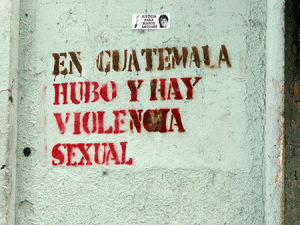Project 2, reported by Lynn Stephen (Department of Anthropology) and Erin Beck (Department of Political Science)
 Report from AY 2016-17: Our project explores two new legal paths that Guatemalan women may travel to access security and justice and uses them to evaluate gendered justice in the U.S. and Guatemala: entering Guatemala’s newly created court system that specializes in violence against women, or fleeing as refugees to the United States where women seek gender asylum. This long-term, transregional, interdisciplinary project compares indigenous women’s access to, and experiences with, new legal spheres in Guatemala and the United States that are designed to facilitate gender justice. It also involves in-depth ethnographic and qualitative analysis of the participants in systems of gendered justice: judges, social workers, advocates in women’s organizations, those who train judges and advocates in themes of gendered violence and its prevention, and survivors of gendered violence.
Report from AY 2016-17: Our project explores two new legal paths that Guatemalan women may travel to access security and justice and uses them to evaluate gendered justice in the U.S. and Guatemala: entering Guatemala’s newly created court system that specializes in violence against women, or fleeing as refugees to the United States where women seek gender asylum. This long-term, transregional, interdisciplinary project compares indigenous women’s access to, and experiences with, new legal spheres in Guatemala and the United States that are designed to facilitate gender justice. It also involves in-depth ethnographic and qualitative analysis of the participants in systems of gendered justice: judges, social workers, advocates in women’s organizations, those who train judges and advocates in themes of gendered violence and its prevention, and survivors of gendered violence.
We have conducted 25 interviews with academics, lawyers, judges, government offices, non-governmental organizations (NGOs), women and men from Todos Santos Cuchamatán, focusing on women’s rights, violence, police and security, historical violence, militarism and paramilitarism, migration, and the successes and challenges of Guatemala’s new specialized courts and justice system for gendered violence. We also conducted archival research at USAC, Avancso, and Cirma. We found that the 2008 law and specialized courts have been somewhat effective in providing a new brand of specialized justice to a significant number of women. Specially trained judges, social workers, psychologists, lawyers and women’s rights advocates and organizations have heard thousands of cases in these specialized courts for femicide and violence against women. Of the 1,894 cases that went through complete trials in these specialized courts between June 2013 and June 2014, 79 percent (1,487) resulted in convictions. This is a conviction rate of 42 percent of all cases that started court proceedings in these specialized tribunals (Unidad de Control, Seguimiento y Evaluación de los Órganos Especializados en Delitos de Femicidio y Otras Formas de Violencia contra la Mujer del Organismo Judicial 2014: 75). These figures are impressive given that in previous years, just two percent of homicides ended in a conviction.
Yet our initial research also found a number of important challenges that have remained unexplored by academics. The weaknesses of the specialized court systems are related to issues of coverage, access, and local officials or local justices of the peace who encourage women to reconcile with perpetrators of gendered violence, thus preventing cases from ever arriving in the courts. Currently, there are only ten specialized courts in a country of over 15 million people. These courts are located in urban departmental centers, out of reach of women who live in more remote areas, are impoverished and isolated, and are monolingual in indigenous languages. Much of the available information about the existence of specialized courts is in Spanish. Whereas the specialized courts offer translation services, many institutions with which women must come into contact before reaching the specialized courts do not. Related institutions that are the initial gateways for the lodging of legal complains, for example, have yet to be reformed. The Public Prosecutors office (Ministerio Publico) lacks translators, personnel trained in cultural competency, and often conducts sloppy investigations, resulting in a lack of evidence for conviction. Even gender-specialized state institutions such as the Defensoria de Mujeres Indigenas (Office for the Defense of Indigenous Women , DEMI) and Municipal Women’s Offices are systematically underfunded and under supported, limiting their ability to meet demands for their services. Our preliminary research provided us with important connections with Guatemalan-based scholars, activists, and research centers, with whom we will partner in the future as this project unfolds over the next few years.
We are planning a spring symposium on “Advances and Barriers to Gendered Justice in Guatemala” on April 13 and a panel on the same topic at the second meeting of the Latin American, Latino, and Iberian Studies Association (LALISA) which will be held at UO from April 13-15. We plan to invite two scholars and activists involved in gender justice in Guatemala. We submitted a proposal to the Latin American Studies Association to fund a larger conference on this topic in Guatemala during the summer of 2017. We plan to continue our fieldwork for this project over the next several years.
